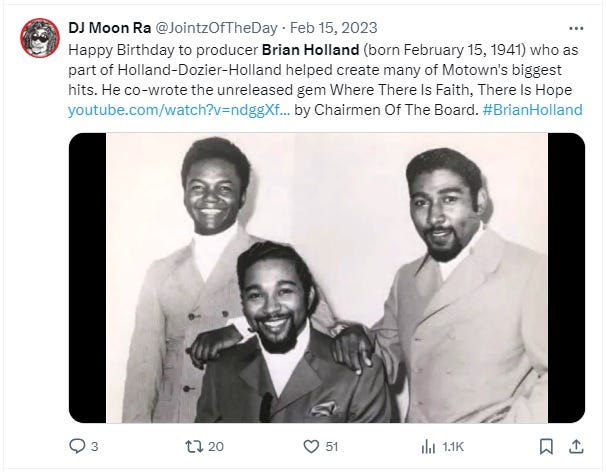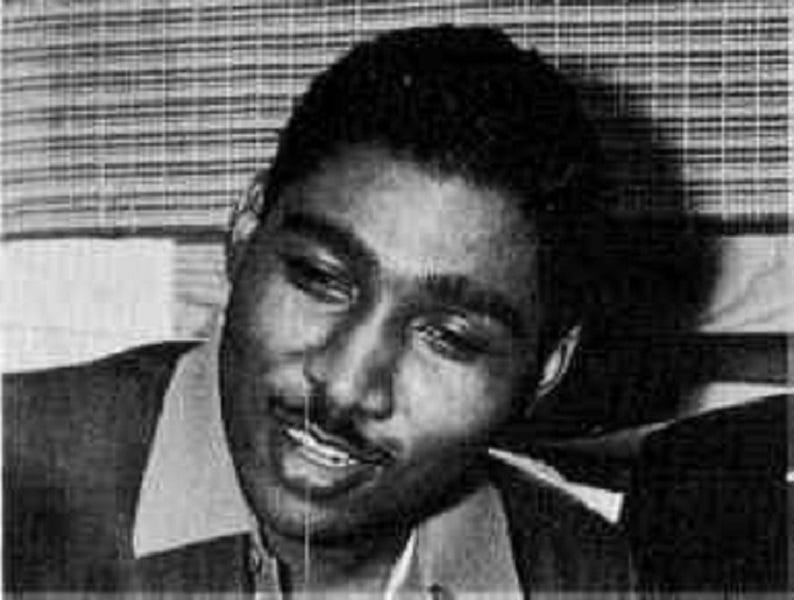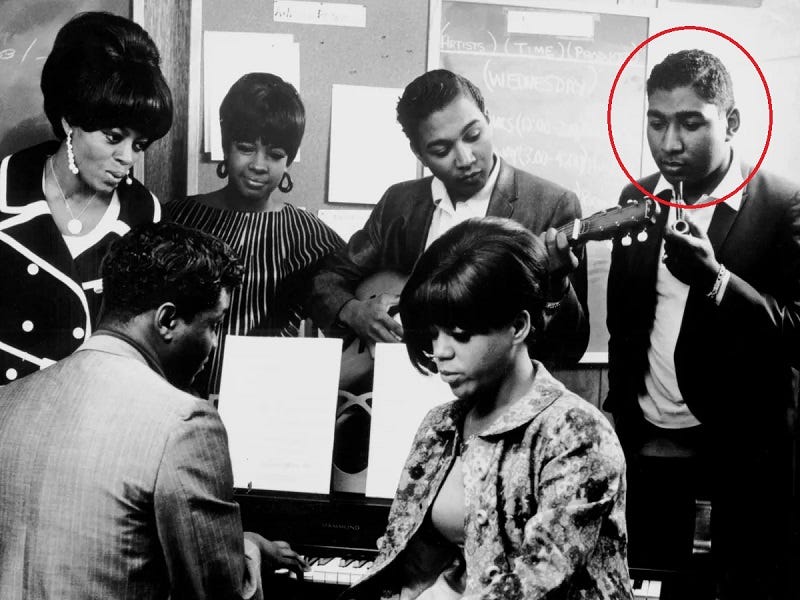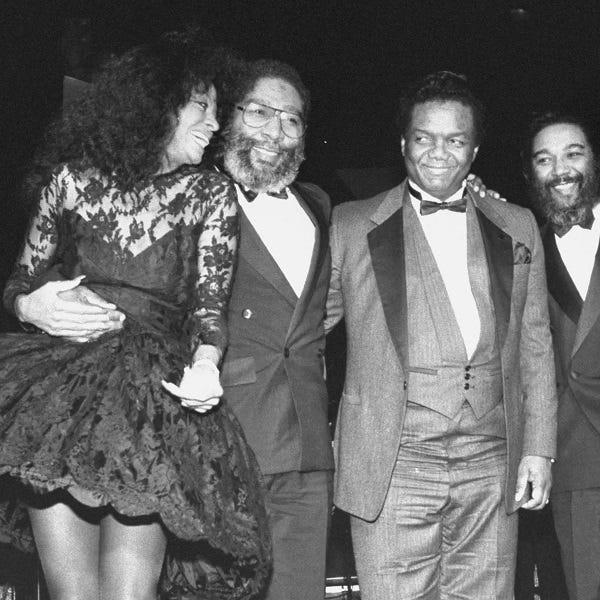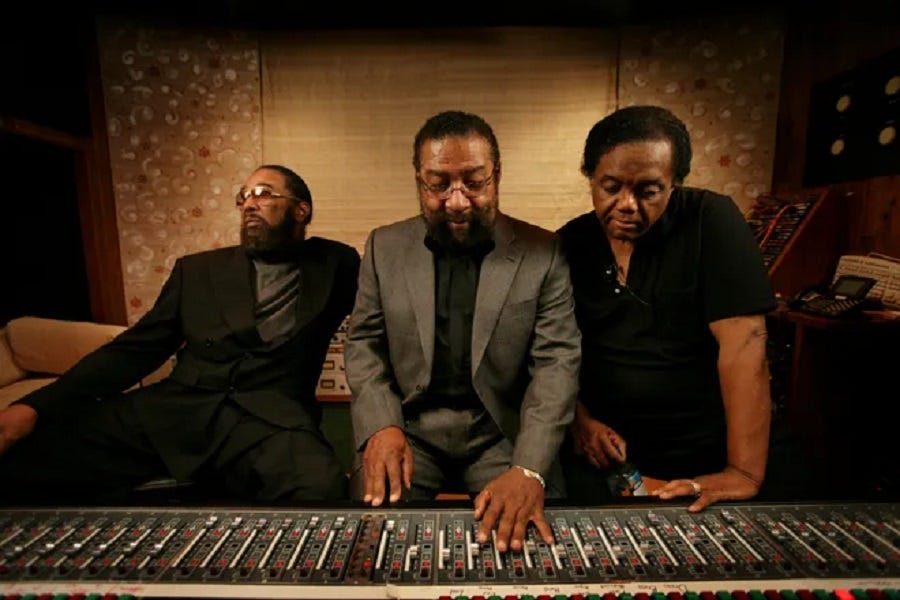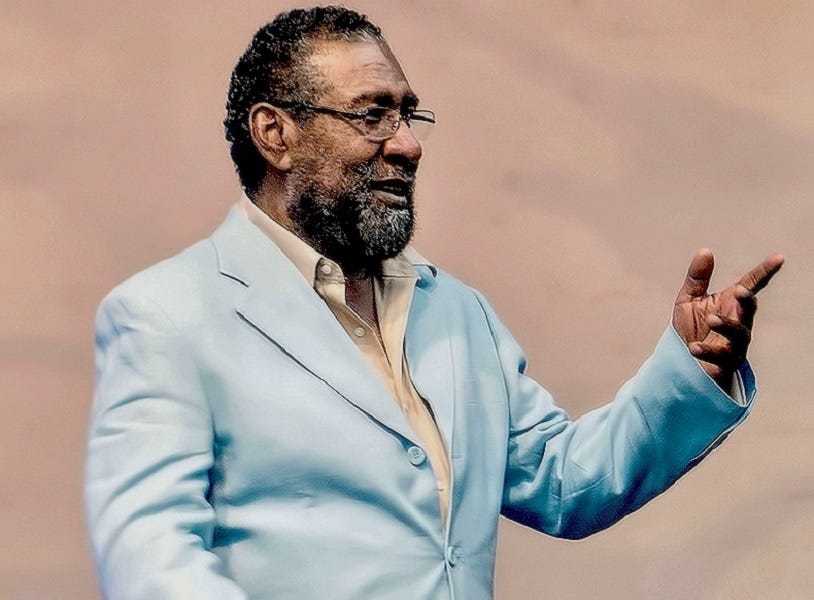Brian Holland (born February 15, 1941) – Where There Is Faith, There Is Hope (1970)
Motown producers Holland-Dozier-Holland co-wrote and produced this epic gospel-soul jam for Chairmen Of The Board, sadly unreleased until 2014.
Watch video on YouTube
View most updated version of this post on Substack
Search our full archives
Brian Holland is a legendary songwriter and producer, part of the Holland-Dozier-Holland production team at Motown and later, their own labels Invictus, Music Merchant, and Hot Wax. Together with his brother Eddie Holland and Lamont Dozier, H-D-H co-wrote and/or produced hundreds of hit songs during the 1960s and 70s, including twenty-five #1 records.
Alongside Lamont Dozier, Brian Holland wrote and produced the music, and Eddie Holland was the team’s lyricist. In a 2005 interview, Brian described his role in their efforts:
“I mainly wrote the melodies and tracks with Lamont, and Eddie wrote the majority of the lyrics. Occasionally, Lamont and I would also come up with lyric ideas. Lamont and I would start writing the songs on piano. Eddie would also be there early on, and we would discuss what the melody and structure should be. Lamont and I would then start recording the tracks, which would be the actual tracks for the master (not just demo tracks).”
See our earlier post on Eddie Holland and on some of the artists H-D-H wrote and produced for like Martha and the Vandellas, Levi Stubbs of the Four Tops, Cindy Birdsong of the Supremes, Barbara McNair, Shorty Long, Laura Lee, General Johnson of Chairmen of the Board, Freda Payne, and Eloise Laws for more on the amazing careers of Holland-Dozier-Holland.
H-D-H wrote and produced several songs for Martha and the Vandellas, including their #1 R&B / #4 Billboard Hot 100 hit “Heat Wave” in 1963 and “Nowhere to Run” which went to #5 R&B / #8 Hot 100 in 1965. They co-wrote and produced “Jimmy Mack” for them in 1964, but it was shockingly rejected by Motown’s quality control department because it sounded too much like a Supremes song, and not released at the time.
It was finally included on their 1966 LP Watchout! and issued as the album’s third single on February 3, 1967, hitting #1 R&B. With U.S. involvement in Vietnam escalating, the song’s refrain about missing an ex-boyfriend “Jimmy Mack, when are you coming back?” took on a deeper meaning and became a subtle call to bring the troops home.
Watchout! also contained the superb “One Way Out,” which they co-wrote and produced. It was released as the B-side to “Love Bug Leave My Heart Alone” in late 1967.
Along with singer/songwriter Debbie Dean, they also co-wrote the stunning “Leave It in the Hands of Love.” Motown included it on Martha and the Vandellas’ 1968 album Ridin’ High, produced by Richard Morris after H-D-H had a falling out with Berry Gordy over royalties and profit-sharing and left the label.
Years later, Brian reflected on whether they realized at the time what great songs they were creating at Motown:
“I would be a fool if I told you I knew these songs would be so big. I felt we could be successful, but I had no idea that these songs would live as long as they have. It’s just been phenomenal. I remember saying back at Motown, ‘Man, I would love to write classic songs, like a ‘White Christmas’.’ As it turns out, many of our songs have become classic, too. But back during that time, we were just focused on writing songs for the current project we were doing.”
One of the final singles Motown released with one of their songs was Barbara Randolph’s cover of “I Got A Feeling” (1967), produced by Hal Davis. H-D-H had written and produced the original version a year earlier for the Four Tops, included on their 1966 album On Top and released as the B-side to “Bernadette” (which was the only H-D-H song they ever wrote with a woman’s name as the title, since all three of them had been in love with different Bernadettes in their lives).
Randolph’s cover of “I Got A Feeling” was destined to become a Northern Soul classic.
After leaving Motown, the trio set up their own label Invictus Records, followed by Music Merchant and Hot Wax Records. Motown sued them for breach of contract, they counter-sued, and the resulting litigation dragged on until 1977.
But they kept on writing, producing, and releasing music on their new labels, with most of their songwriting credited to Wayne-Dunbar while they were legally bound to Motown's publishing arm Jobete. Edith Wayne was the Hollands’ close friend and Ron Dunbar an aspiring songwriter/producer and one of their staff who had followed them from Motown to Invictus. As Dozier explained:
“Brian [Holland] and I came up with “Band of Gold” and “Give Me Just a Little More Time,” but we didn't put our names on 'em because we were in a lawsuit and couldn't use our names. So we used Ronnie Dunbar, who was an employee of ours and Edith Wayne, who was a friend of the Holland family....”
One of the many brilliant tracks they co-wrote and produced post-Motown was the epic gospel-soul jam “Where There Is Faith, There Is Hope” for Chairmen of the Board circa 1970-71, intended for Invictus Records.
It remained sadly unreleased until nearly five decades later in 2014.
Happy 83rd Birthday to the great Brian Holland.
Further info:
“Legendary Trio Holland-Dozier-Holland Talk About Writing Their Motown Hit Songs For The Supremes, Four Tops And Other Artists,” interview by Dale Kawashima, Songwriter Universe, 2005.
“Motown songwriters Holland-Dozier-Holland tell their stories in separate accounts,” VoiceNews.com, December 16, 2019.
Come and Get These Memories: The Genius of Holland-Dozier-Holland, Motown's Incomparable Songwriters, by Eddie and Brian Holland with Dave Thompson, Omnibus Press, 2021.
#soul #funk #Motown #HollandDozierHolland #BrianHolland




